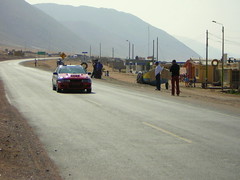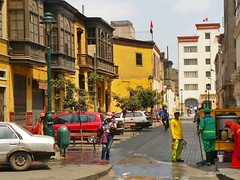Land grabs by technicality in the Amazon
Indigenous Amazonians risk loosing their ancestral lands by way of a Government slight-of-hand which grants concessions and exploration rights to wealthy foreign energy companies.
One of these, US oil company Hunt Oil, which has been granted rights to one of the world’s last untouched areas of cloud forest with unsurpassed levels of bio-diversity, is now demonstrating how this scheme works as they enter into conflict with the Amarakaeri tribe on their reserve in Manu.
Reserves that aren’t Reserved
The story begins long before the aftermath of the Bagua Massacre, but is not a bag place to recap and start. It was June 5th on which heavily armed police removed protesters from the road they were blocking outside the northern city of Bagua. Indigenous groups armed with spears had been there for weeks in an attempt to highlight their cause – they wanted to be consulted over oil concessions on what they considered their lands.
If they were to accept oil extraction on lands their forefathers had lived on since before oil was known to exist, before Peru as a country existed and before Europeans had set foot in the Americas, they wanted a significant cut to outweigh the environmental impact that would end their traditional way of living. Some others wanted to continue their traditional lives and saw no need for schools and medical care should their habitat not be destroyed. Either way, indigenous groups wanted the final say as agreed would be possible by international agreement at the United Nations.
The Peruvian Government considered the resources of the indigenous groups to be the resources of all Peruvians, or rather of the Peruvian Majority. Today, most Peruvians live in westernised cities, and most of these live in the metropolis of Lima. The indigenous groups who had been ignored for decades and had been given few benefits of being citizens of Peru, were expected to welcome the oil companies for the good of the country to which they were supposed to belong.
As the Government stumbled heavy handedly into Bagua with its militarised police force, the protesters did not flee as might have been expected, but instead injured and killed several police officers. Not given the resources to radio for assistance, and headed by a commander known for his love of a good fight, police fired back killing at least 22 protesters.
As indigenous groups deep in the jungle heard of the events on the highway, more police officers lost their lives. Tribal groups had captured an extraction facility 6 hours hike way, seizing a number of police officers charged to protect it. In revenge, a number were executed. Nine police were killed before militarised police re-secured the site with an unknown number of indigenous fatalities.
The Government of Alan Garcia, though furious that the indigenous groups he called second class citizens were against the US Free Trade Agreement and concession reforms he had signed into law without debate or approval from congress that would open up the Amazon to development, was forced to withdraw two of his presidential degrees as pressure mounted to resolve the conflict.
With these laws withdrawn, laws that allowed US oil companies easier access to tribal reserves with less explicit approval, between propaganda to galvanise the urban classes that their was an international conspiracy against Peru from unnamed socialist enemies, heavily emphasised the fact that countless hundreds of thousands of hectares of Amazon forest have been set aside as indigenous communal reserves and nature reserves. That these areas are untouchable.
But how untouchable is untouchable? And how can this really be the case when the exploration and concessions maps of the country show all these reserves sold off the foreign energy interests?
Land grabs by technicality
How can admittedly vast areas of land granted to indigenous tribal peoples really be untouchable if the Government is still granting concessions to oil companies in lots that exist. How can the Government denounce protesters as people stirred up by crazy socialist forces looking to destroy Peru if the protesters, like those with the conflict with Hunt Oil in the south, are denouncing exploration activities inside their tribal lands?
It all comes down to a simple concept that means the government can both grant all the land the indigenous want as protected reserves yet still do whatever they like with that same land.
Antonio Brack, Alan Garcia’s environment minister – a post only set up recently at the bequest of the United States to give an air of morality to their corporations operations in the region – explains the process quite clearly when asked by El Comercio’s Luis Felipe Gamarra.
“Indigenous lands [reserves] are 12 million hectares. There’s nothing going on there. On tribal lands there can be no extraction. Not on protected areas -forest concessions or any other activity”, Brack explains.
“But on the PetroPeru map you can see very clearly that there are [exploration and extraction] concessions on over the lands of some communities”, the interviewer replies.
“We’re talking about the surface. But yes, under the surface, underneath the indigenous territory or forest, if there is gas or petroleum, and Peru needs energy security, that we’ll have to work out”, Brack answers.
It’s almost like being given a house – or in the case of ancestral lands, someone giving you the house you already owned. You and your family can live in it all you want. It’s yours. But if we need to come in a knock it down to get at what lays under it, you have no right to protest.
In the same interview, the interviewer recognises this… that the home must be demolished in the process. Despite regular news of environmental apocalypse in the Amazon during energy extractions, when asked about the environmental impact, the environment minister who everyone accuses of being a stooge for the energy industry replies to the interviewer:
“You are part of a mistaken pattern of thought. It is not true that oil activity affects the forest. An extraction system in a lot of 1 million hectares doesn’t mean you are going to cut down 1 million hectares”, giving the gas pipeline Camisea as one example, where in 148,000 hectares, only 82 hectares were destroyed. Unfortunately, according to environmentalists, part of Peru’s biodiverse cloud forest will be irrevocably damaged by just this much.
Is there an operation you can name that doesn’t contaminate the ecosystem, killing indigenous people in the process, he is asked.
“Lot 8 de Pluspetrol”, but isn’t that going terribly?, “No”, but the natives captured it in 2006 in protest… “But that was three years ago, now there are only a few protests”.
But the pollution, the WWF say they receive reports from the Achuar peoples that spills are still occurring, Brack is asked.
“They say, they say, they say…”, the environment minister responds.
When pushed on a number of specific events and locations, other independent inspections, new techniques that inject contaminated water into the vacuum that the oil extraction left, Brack states that they have been a 100% success. Independent reports that the companies were only injecting 15% of their waste into the subsoil and pumping the rest into the river he replies…
“They’ve told me when I was invited to their plant, but I couldn’t go”. Does he have a better example that shows there is zero contamination the reporter asks:
“BUT I’M TELLING YOU THAT IT’S ALL DIFFERENT NOW! That was 4 or 5 years ago, now they inject 100%”, he exclaims.
But who guarantees this? “Pluspetrol!”.
New Social Conflicts
As the Government reserves the right to sell the rights of practically any part of Peru to energy companies, it’s only logical that more social conflicts will occur. This may be swift and silent in the form of the genocide of an uncontacted tribe coming face to face with intruders and their diseases for the first time, or by indigenous people fighting for a voice in which oil company enters their land and for what price.
Today a group of natives, some 200, have begun a protest against Hunt Oil. The group who live on the Amarakaeri Comunal Reserve, in Salvación near Manu in Madre de Dios, demand that the US oil company cease it’s exploration inside their territory. They say the activities of the company have not been authorised by them, and if they do not cease immediately “actions will be taken”.
Such actions usually mean an attempt to capture the extraction infrastructure in question, and often results in casualties as Peruvian authorities try to protect the foreign investors.
Selling off the Amazon and its people
It is a story repeated throughout modern human history – people living sustainable lifestyles on land rich in resources, who are not forced to work on extracting them for a pittance and are not contributing to the economy in the way the wealthy would like… have no value. They must change in the name of progress. They must move into shanty towns, work dangerous jobs until the resources are gone and they must spend the rest of their time consuming alcohol. This is the story of Brazil’s Amazonian progress, and it’s a “success story” that Peruvian President Alan Garcia wanted to repeat in Peru.
Read more about the lead up to the Bagua Massacre »
Half the Peruvian Amazon covered with oil leases
This article from 2007 states that 50% of the Amazon has been sold off to energy interests. It now stands at 72% and climbing, increasing covering tribal lands.
The locals have little ability to complain, but due to increased pressure on the health of their people and their way of life, they are trying to fight back. Last year the Achuar people were able to shut down two operations of PlusPetrol Norte for 14 days. This was 50 percent of national production.  This was brought on by PlusPetrol dumping as much as a million barrels of oil and chemical contaminated waste water directly into local rivers on a daily basis, seriously affecting the health of the Achuar who rely on the river for all their needs. PlusPetrol reluctantly accepted the peoples demands to invest in equipment to re-inject waste into the ground, and build a local hospital and to an emergency supply of food to those starving villages who’s traditional food source was wiped out. They also demanded that no more invasions of their territory by new drilling operations would take place but this was rejected by PlusPetrol with the support of the Peruvian Government. PlusPetrol have since filed charges against many of the Achuar for the blockade, alleging, “coercion, criminal trespassing, aggravated kidnapping, and assault against public security”.
This was brought on by PlusPetrol dumping as much as a million barrels of oil and chemical contaminated waste water directly into local rivers on a daily basis, seriously affecting the health of the Achuar who rely on the river for all their needs. PlusPetrol reluctantly accepted the peoples demands to invest in equipment to re-inject waste into the ground, and build a local hospital and to an emergency supply of food to those starving villages who’s traditional food source was wiped out. They also demanded that no more invasions of their territory by new drilling operations would take place but this was rejected by PlusPetrol with the support of the Peruvian Government. PlusPetrol have since filed charges against many of the Achuar for the blockade, alleging, “coercion, criminal trespassing, aggravated kidnapping, and assault against public security”.
Read more about the sale of the Amazon »
Tags: amazon, antonio brack, bagua, environment, free trade, hunt oil, indigenous, madre de dios, manu, oil, petrolperu, pollution, uncontacted tribes



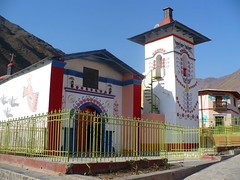

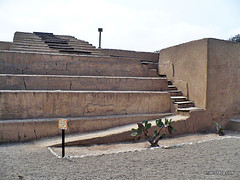
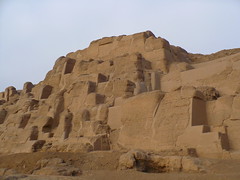
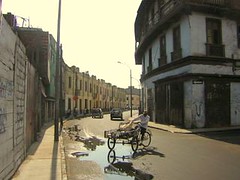
![Can painting a mountain restore a glacier? [Featured]](http://farm5.static.flickr.com/4005/4709411161_33137b8a6d_m.jpg)
